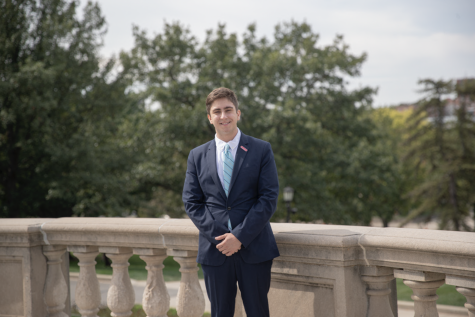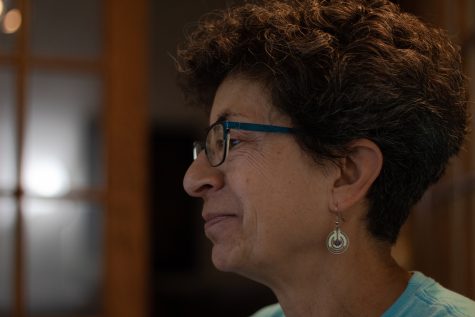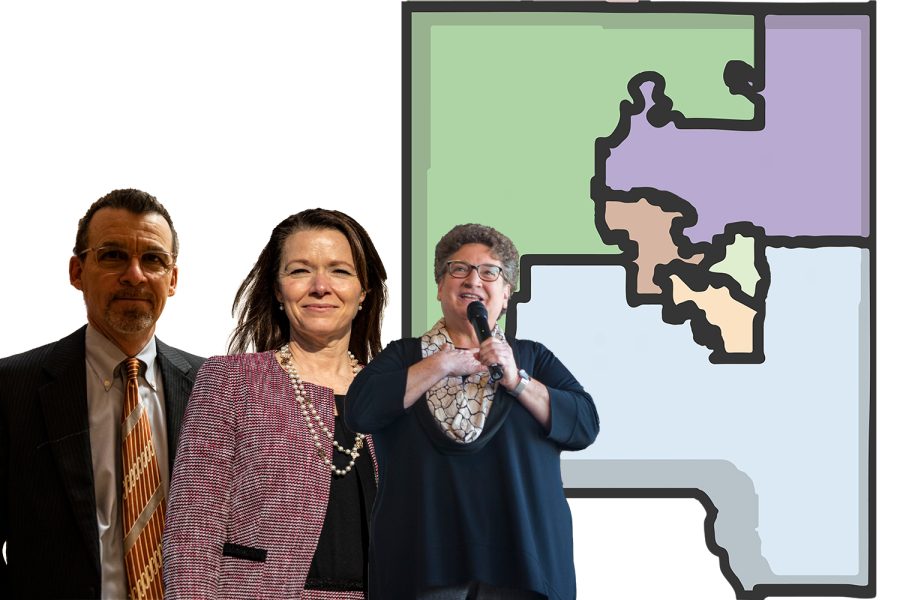Fresh faces will represent Johnson County in 2023
In 2022, four Iowans will be newly elected to represent Johnson County in the Statehouse. Politicians from both parties agree that a change in faces will bring new ideas to the foreground.
From left, Democrats Sen. Joe Bolkcom, Rep. Christina Bohannan, and Rep. Mary Mascher, who all represent Iowa City in front of a map of Johnson County. Graphic by Caleb McCullough.
November 14, 2021
At least four new faces will represent Johnson County under the golden dome in Des Moines following the 2022 election. Political leaders from both parties in Iowa said it will be a refreshing change that brings new ideas to the Statehouse.
The four available seats in 2022 will be Iowa Senate District 45 and Iowa House Districts 89, 90, and 85, a newly-drawn district.
Rep. Christina Bohannan, D-Iowa City, is running for Iowa’s newly drawn 1st Congressional District, which means her seat in the Legislature will be available.
Rep. Mary Mascher, D-Iowa City, announced on Nov. 8 that she will not run for reelection. Mascher represents Iowa’s 86th House district, and under the new maps she would be in the 89th.
“It’s an opportunity for new blood, new life, new people coming in with new perspectives. And I think that’s always healthy for a system,” Mascher said.
Mascher has held her legislative seat for 20 years, but said her experience wouldn’t necessarily make her better for the seat as every representative is replaceable. She said she wants to encourage people to run and hopes to mentor incoming legislators in order to smooth their transition.
“None of us has a lock on the seats, they belong to the people and people get to decide who they want to represent them,” Mascher said.
Sen. Joe Bolkcom, D-Iowa City, announced that he will not run for reelection in 2022 because he wants fresh ideas and voices to take his place in the Iowa Senate. He has served in the Iowa Senate since 1999.
“It’ll be good. I’m just saying, it’s new people who will come in and learn the process just like I did and Representative Mascher did when we joined up years ago,” Bolkcom said.
Bolkcom said that it’s important for new members to reach across party lines and get to know colleagues from both parties, especially those who work on topics and issues they are interested in.
Bohannan sent tweets honoring Mascher and Bolkcom and their decisions not to run for reelection and thanking both for their public service.
Joe, you’ve been a mentor and a friend–THANK YOU for your service and your leadership. Whoever runs for your seat has big shoes to fill. @iowademocrats @IowaSenate https://t.co/jn4v6E8hz2
— Christina Bohannan (@BohannanIowa) November 4, 2021
Mary, you’ve been a tremendous public servant. Thank you for being a supportive mentor, and thank you for your service to the people of Iowa. Congratulations on a well deserved retirement! https://t.co/wYLx16gXcG
— Christina Bohannan (@BohannanIowa) November 8, 2021
Frederick Boehmke, a University of Iowa political science professor, said it is not uncommon for legislators to make decisions about whether to run for reelection based on how their district gets redrawn every 10 years. Legislative district maps, proposed by the nonpartisan Legislative Services Agency, were signed into law by Gov. Kim Reynolds this month.
“When you change the lines for incumbents who have invested in getting to know their constituents, you know, ideally across all the different parts of their district, that also creates uncertainty for them,” Boehmke said.
RELATED: Iowa Sen. Joe Bolkcom will not seek reelection in 2022
Mascher said that she did not choose to retire due to redistricting because the lines of her district did not change much, but rather that the timing was right.
She hopes to see people run who reflect the goals and values of Johnson County constituents, Mascher said. She said the Legislature needs to diversify in order to represent Iowans.
“I think that’s important as well, to have the population in Des Moines reflect our population,” Mascher said. “And I think it’s important to encourage people within our community who have an interest in doing that, helping them and identifying what they can do to be able to get themselves on the ballot.”
Democrats in the Iowa Legislature are in the minority, and that is why Bolkcom said his goal for new Democratic legislators will be to flip seats and gain a majority in either the House or Senate.
Bolkcom said flipping a chamber is most important for Democrats because making legislative moves will continue to be a struggle when in the minority party.
“The issues are less important when you’re in the minority party and working to get into the majority is more important,” Bolkcom said.
Johnson County is the most Democratic county in the state, and Democrats have traditionally won all of the districts in the county in recent years.
Rep. Bobby Kaufmann, R-Wilton, is the only Republican representing Johnson County. His district covers Cedar County and the eastern portion of rural Johnson County.
The newly drawn House districts split Cedar and Johnson Counties, and Kaufmann would no longer represent Johnson County if he wins reelection in 2022.
Kaufmann said seeing new faces representing Iowans in Johnson County can be a good thing, but legislators need to keep in mind that the county is made up of both rural and urban residents and to work for both.
“I’m still going to be taking people’s phone calls. I’m still going to respond to people’s emails, and I’m still going to be pushing for very important legislation,” Kaufmann said.
RELATED: Rep. Mary Mascher not seeking reelection to Iowa House
Kaufmann said he has heard from Republicans in his district who plan to run for a seat in the Legislature under the new boundaries. He said rural Johnson County will be easy for Republicans to win and will be an opportunity for Republicans to fight for their priorities.
“I think with the atmosphere that is in our favor, so tremendously due to a failed federal administration, I think that Republicans are going to be playing offense in all counties in Iowa, not just defense,” Kaufmann said.
Kaufmann said there is a learning curve for new legislators throughout the first year of serving. He said the Iowa Legislature gives freshman representatives and senators an opportunity to jump right in through committee and subcommittee work.
“I think the process in Iowa is conducive to allowing people to basically work as hard as you want to work, and the harder you work, the more opportunities you get,” Kaufmann said.
Immediately after the redistricting process is when the majority party has the best chances of gaining seats in the Legislature, Boehmke said. Over time, the general demographic features of the district slowly change as people move and constituents no longer have the same priorities.
Boehmke said that the chances of either chamber of the Legislature being flipped is small. It would take a more regional, or even national, wave — through a presidential candidate, or political movement — to flip the seats drastically, he said.
Andrew Dunn, a University of Iowa student and candidate for Iowa House District 85, said he is sad to see Bolkcom and Mascher leave, but that a change in legislators will give intelligent and principled people an opportunity to fill their shoes.

Climate change, education funding, access to affordable housing, and affordable child care are some of the priorities Dunn hopes new legislators will bring to light. He said he wants the upcoming round of legislators statewide to reach across the aisle for more legislation that will benefit rural and urban Iowans.
“We have to figure out how to build the relationships with rural communities to, you know, really break through a massive political culture war,” Dunn said.
Dunn and Elinor Levin, a candidate for Iowa State House of Representatives District 89, are the only candidates so far to publicly announce a bid for a seat in the Iowa Statehouse to represent Johnson County.
Janice Weiner, current Iowa City city councilor, told The Daily Iowan she will announce her election campaign for the Iowa Senate soon.

Weiner said a change in representation is healthy for democracy. She said bringing new people into the Statehouse will help shine light on new issues.
“That’s the real positive of it. It will help integrate democracy and bring new people into the process here. I hope we’ll see multiple candidates from both parties,” Weiner said.
Boehmke said that the longer a legislator is in office, the more they can get done — both policy-wise and passing governmental requests, like grants — because of the relationships they have made. This is one reason, he said, it is interesting when incumbents step down or retire.
“There’s a very large number of open seats, two of which haven’t been open for decades. So, I think that creates an interesting political situation to see what develops there and who chooses to run for those seats,” Boehmke said.



